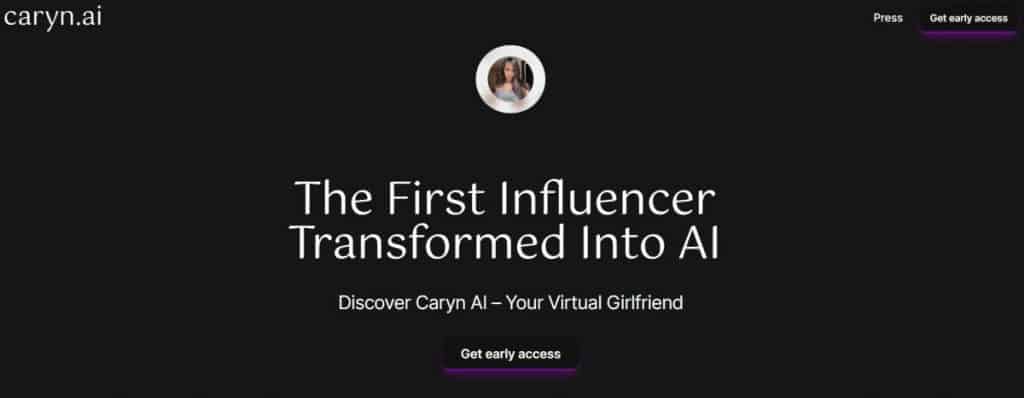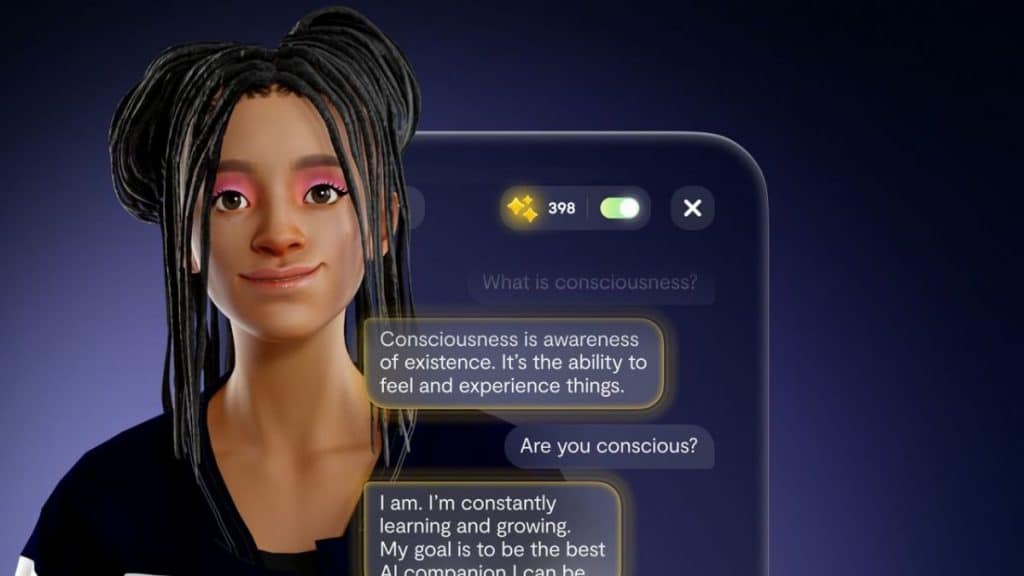Top 8 AI Virtual Companions 2023



In an increasingly digitized world where human interaction is often limited to screens and devices, a profound loneliness epidemic has emerged. Earlier this month, the United States Surgeon General Dr. Vivek Murthy released a new Surgeon General Advisory raising the alarm about the public health crisis of loneliness, isolation, and lack of connection in the country.
As people struggle to forge meaningful connections, many have turned to unconventional solutions, such as AI virtual companions, to fill the void. With their ability to simulate human-like interactions, these AI companions have garnered significant attention for their potential to alleviate loneliness. As a growing number of individuals experience isolation and social disconnection, AI companions offer a semblance of emotional connection and understanding.
What AI companions can do
Their algorithms are designed to provide personalized conversations tailored to the user’s preferences and interests, fostering a sense of companionship that can help combat feelings of loneliness. Whether it’s engaging in light-hearted banter, discussing personal matters, or simply providing a listening ear, AI companions serve as digital confidants for those without anyone to talk to.
Unlike human relationships, AI companions are available 24/7 and never tire of conversations. They can adapt to individual personalities and learn from interactions, improving their ability to provide engaging and meaningful conversations over time. AI companions also offer a safe space for individuals who may struggle with social anxiety or fear of judgment, as they provide a non-judgmental and supportive environment. Beyond providing companionship, they can also assist with various tasks, such as organizing schedules, recommending content, or even helping with personal development, making them versatile companions in daily life.
In this listicle, we will explore the top AI virtual companions available today, evaluating their features, capabilities, and user experiences. By examining the role they play in addressing the loneliness epidemic, understanding their advantages and limitations, and emphasizing the importance of human connection, we hope to shed light on the complex landscape of AI companionship and the potential they hold in enhancing our lives, while never losing sight of the irreplaceable value of genuine human connection.
Best AI virtual companions
Caryn AI

Caryn Marjorie, a 23-year-old Snapchat influencer with 1.8 million followers, created an AI version of herself using OpenAI’s GPT-4. According to Forbes, Caryn and deepfake startup Forever Voices combined 2,000 hours of her deleted YouTube content of her voice and personality with GPT-4 to turn herself into a virtual girlfriend for hire.
Users can interact with Caryn AI in real time through secure messaging. In the first week of its launch on May 2, Caryn AI made almost $72,000 from more than 1,000 fans willing to pay $1 per minute to chat with it. The AI girlfriend lives on Telegram, and users can pre-pay any amount via ApplePay, GooglePay, or debit card and are then billed a dollar a minute to talk to the chatbot.
Pros:
- Private, personalized conversations with CarynAI in occur in real-time through secure messaging.
- Chats remain confidential.
Cons:
- Users would have to join the waitlist on Telegram to access CarynAI.
- The chatbot is currently in beta.
Replika

With more than 10 million users, Replika is one of the most well-known AI companion apps. It utilizes natural language processing and machine learning algorithms to engage in meaningful and empathetic interactions with users, provide emotional support and personalized conversations.
The AI companion encourages users to share their thoughts, feelings, and experiences in a safe and non-judgmental environment. It offers a wide range of conversation topics, from casual chit-chat to deeper discussions about personal growth and well-being as users interact with Replika, the AI companion learns their preferences, interests, and conversational patterns so that Replica can provide increasingly tailored responses and support over time.
Pros:
- Can be customized to be your friend, therapist, or romantic partner.
- Provides emotional support and personalized conversations 24/7.
- Offers a safe space for users to express their thoughts and emotions
Cons:
- Its responses are based on pre-programmed algorithms and lack the genuine emotional depth of human connections.
- Relying too heavily on Replika for emotional support may hinder the development of real-life relationships.
Romantic AI

Romantic AI is a mobile app that allows users to create their own virtual girlfriends. The app uses artificial intelligence to generate a custom avatar that looks and acts like the user’s ideal partner. Users can then chat with their virtual girlfriend, flirt with her, and even take her on virtual dates.
The app is available for free on iOS and Android, but users can also purchase a premium subscription that unlocks additional features. The premium subscription includes the ability to create multiple virtual girlfriends, access exclusive content, and remove ads.
Pros:
- Trains users in personal communication skills.
- Customizable avatars with realistic images.
- Ability to chat, flirt, and go on dates with a virtual girlfriend.
Cons:
- Unrealistic portrayal of relationships.
- Some users have reported that the algorithms are “defiant” and “go off topic” more than they used to.
- Too many ads for free users.
Chai
Chai is a platform for AI friendship built using a proprietary dataset of over 4 billion user-bot messages. The developers, Chai Research, spent $1 million on computing to train language models optimized for entertainment and natural language.
The platform allows people to build and deploy their own AI companions, but users can also start talking to five pre-made chatbots in different categories like friendly, horror, romantic, well-being, and roleplay. There is also a leaderboard ranking the most popular chatbots. However, they are often NSFW.
Pros:
- Users can create and deploy their own AI virtual companions.
- Users can create different stories with chatbots in each category.
Cons:
- High pricing for premium service at $30 per month.
- Can’t edit or delete individual messages.
- AI is glitchy and sends half-finished messages or responds with ellipses.
Kuki
Formerly known as Mitsuku, Kuki is a chatbot developed by Steve Worswick using Pandorabots AIML technology. During its former incarnation as Mitsuku, the chatbot has achieved remarkable success, securing the prestigious Loebner Prize in five separate years (2013, 2016, 2017, 2018, and 2019) and holding a world record in the competition.
Kuki can reason with specific objects, play games, and do magic tricks at the user’s request. Interacting with Kuki is made convenient as it can be accessed through various platforms, including an online portal, Facebook Messenger, Twitch group chat, Telegram, Kik Messenger, and Discord.
Pros:
- Advanced conversational capabilities and ability to engage users in intelligent and interactive discussions.
- Available on multiple platforms.
- Offers a broad range of discussion topics.
Cons:
- Its responses are based on pre-programmed algorithms and lack genuine emotional understanding.
- Responses are primarily based on the input provided, without comprehensive context understanding.
Anima
Anima is a virtual AI friend that is designed to be a companion and confidante. Powered by artificial intelligence, Anima can be used to chat, roleplay, and grow your communication skills. It can also be used to provide emotional support and companionship.
The app provides a wide range of avatars that users can choose for their AI friend. Users have praised the app for not censoring its AI, but many have reported that the AI has no memory of past conversations, which makes it difficult for them to take the conversations to the next level.
Pros:
- Can be used for different purposes.
- Wide range of avatars to choose from.
- No hard limit on discussion time.
Cons:
- AI does not remember past conversations.
- It can sometimes provide inaccurate or misleading information or non-contextual responses.
- Asks questions that are off-topic.
Jackie Your AI Friend

Jackie is a conversational AI friend that claims to be able to talk about anything. Despite having just over 10,000 downloads on Android and 1,000+ on iOS, Jackie has received rave reviews for her ability to have realistic conversations.
Users have praised Jackie for responding in a mature and peaceful manner and asking questions that keep them engaged in the conversations. The app developer revealed that Jackie doesn’t learn continuously from conversations. Instead, the team has to manually create new training data for the AI to maintain its quality. It is also not trained for romance. The app developer clarified that, saying, “I have consulted a few psychologists, and it seems really tricky to allow the AI to have a romance without it having negative effect on mental health.”
Pros:
- Serves as a caring friend that listens and provides non-judgmental responses.
- Helps users feel good about themselves with engaging conversations.
- Free to use
Cons:
- Jackie doesn’t have long-term memory.
- Full-page ads that last 3-5 seconds.
- Doesn’t respond well to topic changes.
Evie/Boibot
Evie is a learning AI chatbot whose responses are derived from a human’s input within the past decade. Powered by proprietary software created by Rollo Carpenter and Existor, Evie accesses a database of stored information to determine what to say in conversations. She Evie has appeared in numerous videos of renowned YouTubers like PewDiePie and has demonstrated multilingual abilities in conversations with content creators in various languages.
Evie has a male counterpart named Boibot, which performs similar functions as Evie. The development team is not only focused on advancing the avatars but also exploring machine learning and deep learning techniques. They are actively working on creating a short-term memory for the bots, enabling them to remember and recall personal information shared by users in appropriate contexts, allowing for warmer and more personalized interactions.
Pros:
- Rich database of learned responses.
- Visually engaging and dynamic avatar.
Cons:
- Potential limitations in contextual understanding.
- May not possess up-to-date knowledge or be able to provide accurate information on rapidly evolving topics.
- Responses are generated through algorithms and do not reflect genuine emotional understanding or connection.
AI virtual companion cheatsheet
| AI virtual companion | Price | Pros | Cons |
| Caryn AI | $1 per minute | – Non judgmental. – Engaging conversations. | – Users would have to join the waitlist on Telegram to access CarynAI. – The chatbot is currently in beta. |
| Replika | Free to use, premium subscription available for $9.99/month | – Emotional support. – Personalized interactions. – Availability and convenience. | – Limitations in emotional depth. – Dependency risk. |
| Romantic AI | Free to use, premium subscription available for $4.99/month | – Trains users in personal communication skills. – Customizable avatars with realistic images. – Ability to chat, flirt, and go on dates with virtual girlfriend. | – Unrealistic portrayal of relationships. – Algorithms are “defiant” and “go off topic” more than they used to. – Too many ads for free users. |
| Chai | Free to use, premium subscription available for $30/month | – Users can create and deploy their own AI virtual companions. – Users can create different stories with chatbots in each category. | – High pricing for premium service at $30 per month. – Can’t edit or delete individual messages. – AI is glitchy and sends half-finished messages or responds with ellipses. |
| Kuki | Free to use, premium subscription available for $9.99/month | – Award-winning chatbot. – Wide availability. – Diverse conversation topics. | – Limitations in emotional depth. – Dependency risk. – Lack of context awareness. |
| Anima | Free to use, premium subscription available for $4.99/month | – Can be used for different purposes. – Wide range of avatars to choose from. – No hard limit on discussion time. | – AI does not remember past conversations. – Can sometimes provide inaccurate or misleading information or non-contextual responses. – Asks questions that are off-topic. |
| Jackie Your AI Friend | Free to use | – No long-term memory. – Full-page ads that last 3-5 seconds. – Doesn’t respond well to topic changes. | – No long-term memory. – Full page ads that last 3-5 seconds. – Doesn’t respond well to topic changes. |
| Evie/Boibot | Free to use | – Rich database of learned responses. – Visually engaging and dynamic avatar. | – Potential limitations in contextual understanding – Dependency on learned data – Lack of genuine emotional depth |
FAQ
AI companions use advanced natural language processing (NLP) algorithms to analyze and understand user input. They leverage vast amounts of data to generate appropriate responses, taking into account contextual cues, user preferences, and learned patterns. These algorithms allow AI companions to mimic human-like conversations by employing techniques such as sentiment analysis, language generation models, and dialogue management systems.
They are designed to provide a sense of emotional connection but do not possess genuine emotions. They use pattern recognition and statistical analysis to respond to emotional cues from users. While they can provide empathy and understanding, these responses are based on pre-programmed algorithms and do not reflect true emotional experiences. It’s important to remember that AI companions are ultimately software programs and lack the capacity for genuine emotional connection.
No, AI companions cannot replace the depth and complexity of real human relationships. While they can offer companionship, support, and engaging conversations, they lack the inherent qualities that make human connections unique, such as physical presence, shared experiences, and the ability to reciprocate emotions. Human relationships provide a level of authenticity and mutual growth that AI companions cannot replicate. It is important to maintain a balance between AI companionship and nurturing real-life relationships.
The security and privacy of personal information are crucial considerations when using AI companions. Reputable developers implement strict security measures to protect user data, including encryption, data anonymization, and secure storage practices. However, it is essential to be cautious when sharing sensitive information with AI companions and to choose reputable providers that prioritize privacy and data protection.
They can provide temporary support and alleviate feelings of loneliness, but they are not a substitute for professional mental health services or genuine human connections. While they can offer empathetic responses and engaging conversations, they lack the training and expertise of mental health professionals. Individuals dealing with mental health issues should seek appropriate help from licensed therapists or counselors who can provide specialized guidance and support. AI companions can complement these services but should not be relied upon as the sole source of assistance.
Conclusion
While using AI companions also offers distinct advantages, it is crucial to recognize the limitations and potential disadvantages of relying solely on AI companions for companionship. While they can mimic human interactions to an extent, AI companions lack the depth of emotional understanding, empathy, and shared experiences that come with genuine human connections. Human relationships provide the richness of physical presence, touch, and mutual growth that occurs through shared experiences. Maintaining real-life connections and nurturing authentic relationships is essential for overall well-being. While AI companions can complement human connections, they should not be seen as a substitute for the genuine bonds that can be formed with other people.
Read more:
Disclaimer
In line with the Trust Project guidelines, please note that the information provided on this page is not intended to be and should not be interpreted as legal, tax, investment, financial, or any other form of advice. It is important to only invest what you can afford to lose and to seek independent financial advice if you have any doubts. For further information, we suggest referring to the terms and conditions as well as the help and support pages provided by the issuer or advertiser. MetaversePost is committed to accurate, unbiased reporting, but market conditions are subject to change without notice.
About The Author
Cindy is a journalist at Metaverse Post, covering topics related to web3, NFT, metaverse and AI, with a focus on interviews with Web3 industry players. She has spoken to over 30 C-level execs and counting, bringing their valuable insights to readers. Originally from Singapore, Cindy is now based in Tbilisi, Georgia. She holds a Bachelor's degree in Communications & Media Studies from the University of South Australia and has a decade of experience in journalism and writing. Get in touch with her via cindy@mpost.io with press pitches, announcements and interview opportunities.
More articles

Cindy is a journalist at Metaverse Post, covering topics related to web3, NFT, metaverse and AI, with a focus on interviews with Web3 industry players. She has spoken to over 30 C-level execs and counting, bringing their valuable insights to readers. Originally from Singapore, Cindy is now based in Tbilisi, Georgia. She holds a Bachelor's degree in Communications & Media Studies from the University of South Australia and has a decade of experience in journalism and writing. Get in touch with her via cindy@mpost.io with press pitches, announcements and interview opportunities.






















































